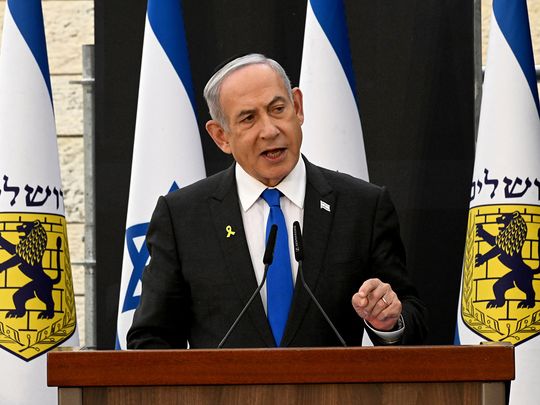
Benjamin Netanyahu has drawn yet another redline to impede any sustainable ceasefire in Gaza. As nationwide protests swarm Israel demanding the release of the 90 remaining hostages, Netanyahu realises that when the guns go silent, he will be automatically forced out of office and most probably tried for allowing the 7 October attack to happen.
And that might explain why the Israeli premier has successfully managed to thwart every single peace initiative put on the table since then, now saying that under no conditions will he withdraw from the Salah Al Din Corridor, or what the Israelis call the Philadelphi Route, a narrow border crossing 100 meters wide and 14-km long stretching between Gaza and Egypt.
Netanyahu insists that it this strip provides “oxygen” to Hamas and is being used to smuggle arms and goods to the Gaza Strip. The desire to reoccupy the corridor is not new, and two months into the present conflict, Netanyahu said it openly to a Knesset Foreign Affairs and Security Committee on 11 December 2023. Last January, Egypt warned that any reoccupation of the corridor would be a violation of accords signed between President Anwar Al Sadat and Menachem Begin.
Back then, Israel demanded a buffer zone along the border with Gaza, claiming that the Salah Al Din Corridor was being used to smuggle arms to the Palestinians. With the 2005 unilateral withdrawal from Gaza, many in the Israeli military establishment spoke strongly against abandoning Salah Al Din, claiming that putting it in the hands of the Palestinians would pose a security threat both to Israel and Egypt.
An Accord was then reached over the corridor, mandating 750 Egyptian border guards to police the area, while the Palestinian side would be handled by President Mahmud Abbas’ Palestinian National Authority (PNA).
A security threat to Egypt
Things remained relatively quiet and mostly under control until Hamas overran the Gaza Strip in June 2007, expelling the PNA and setting up a parallel authority. Alarm bells began ringing when Morsi came to power in Egypt in June 2012, allowing for the free passage of goods, people, and arms into Hamas-held Gaza.
And it was during that same period that Ansar Beit Al Maqdis, the local branch of the so-called Islamic State (Daesh) began its terrorist attacks in Sinai, using Nato arms smuggled from neighbouring Libya, and Palestinian arms smuggled from Gaza. Simultaneously, a Palestinian-branch of Daesh emerged in Gaza, calling itself the Omar Hadid Brigades, carrying Abu Bakr Al Baghdadi’s black banner.
In October 2014, Egypt, by now under President Abdul Fattah Al Sisi, announced that it wanted to expand the buffer zone with Gaza, following a terrorist attack in July that killed no less than 21 Egyptian soldiers in the Al Wadi Al Gedid area.
Had it not been for the Gaza War, then nothing would have pleased Egyptian officialdom more than placing the Salah Al Din Crossing under lock and key. But now, and in light of a death toll that is nearing 41,000 Palestinians, Cairo fears that this would further suffocate innocent civilians, a view shared by the Biden Administration that has also called on Netanyahu to withdraw completely from Salah Al Din route.
There is very little the US can do to enforce that, however, now that Joe Biden has begun his long march into history and what remains of his administration are working around the clock for a Kamala Harris victory.
Last May, Netanyahu took over the Rafah Crossing and stationed troops within the Salah Al Din Corridor, in total disregard for the Egyptian-Israel Peace Agreement. Three months later in August, he began toying with the idea of cancelling the Salah Al Din accord with Egypt, and thus, restoring full control to the Israel Army. Egypt replied with a flat: no.
Netanyahu now wants to regain full control of the corridor, describing it as a “redline” that he cannot cross by withdrawal. “The only way to deal with it (the crossing) was to conquer Gaza. But we knew neither had the domestic legitimacy nor the international legitimacy to do it. We didn’t have the legitimacy before the Oct. 7 massacre.
The US claims that any ceasefire deal must include a full withdrawal from the Salah Al Din Corridor, after six of the Israeli hostages taken on 7 October were killed.
— Sami Moubayed is a historian and former Carnegie scholar. He is also author of the best-seller Under the Black Flag: At the frontier of the New Jihad.









